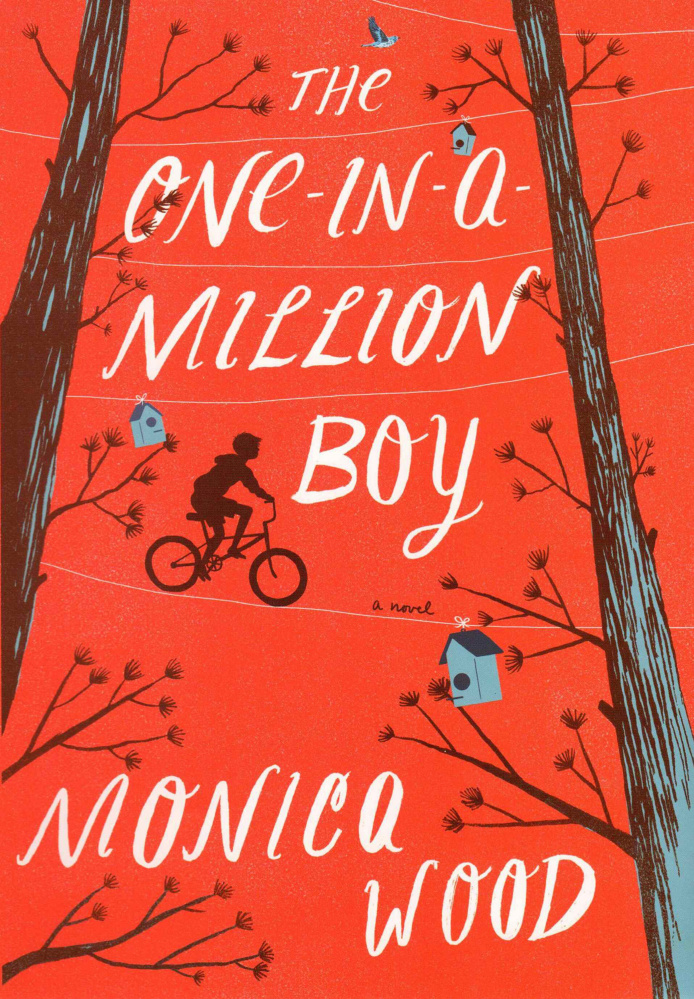The boy is dead. Readers learn that on the third page of Monica Wood’s new book, “The One-in-a-Million Boy.” They will, however, never learn his name. He is referred to simply as “the boy.”
Yet he is a present and unifying force throughout this intricately woven novel, which tells the story primarily of Ona Vitkus, a 104-year-old Lithuanian woman who lives alone in Portland, and Quinn Porter, a guitar-playing dreamer past his prime and the forever-perplexed father of the Boy.
The boy is both there and not there, in many dimensions. He is present in the richly textured backstory of a run of Saturdays he spent with Miss Vitkus to fulfill a Scout commitment to perform community service. He is present, and yet not quite, in an intriguing set of tape recordings he made interviewing Ona about her life for a school project. He is not there, but paradoxically not-quite not there, in lists of Guinness records he kept on birds, travel, family, patience, amazing feats and more.
He is also there, but not-quite not there, in the entire unfolding of the story of how Ona and Quinn forge an offbeat friendship when, after the boy dies, Quinn comes to her house to fulfill his son’s service commitment. And he is, as well, there and not there as a wonderfully drawn actual character, a boy with Asperger syndrome-like behaviors, with a fixation on world records and facts about the world he gathers and recites in sets of 10.
The boy rises in the story like an otherworldly being, yet at the same time he is a thoroughly real and lovable presence.
Both Ona and Quinn feel there is something “wrong” and puzzling about the boy. But Ona comes to adore him, his unfiltered questions and responses in their exchanges, his unbeguiling, plainspoken truthfulness, prompting her to reveal her life secrets to him, secrets she has hidden for decades.
Quinn, conversely, never becomes comfortable in his son’s presence and cannot manage to establish a connection with him. In one immensely painful scene, Quinn tries to share his love of music and guitars with the boy but misses by a million miles:
” ‘You hear the solo coming in now,’ Quinn tells the boy as they sit listening to Eric Clapton. ‘Listen to that call and response.’ He shook his head in wonderment, as he always did, but it felt, again for the first time, like a learned gesture, and he was beginning to blame the boy for ruining one of his trustworthy sources of bliss. ‘It’s a conversation he’s having with himself. You hear that? It’s like something rising out of the goddamn sea. Just listen.’ ”
“The One-in-a-Million Boy” is Maine native Monica Wood’s most ambitious book yet. It is, like all her stories, about love – love not given, love given generously, love not understood and love as simple and uncomplicated as a songbird’s call.
It is an intricately layered story, though some plot threads in the latter half of the book seem unnecessary. But “The One-in-a-Million Boy” is provocative, and it evokes Anthony Doerr’s “All the Light We Cannot See,” for its twin story lines and the theme of endless searching for an anchor point.
The ending is a deeply affecting surprise. It peals with the notion that love and understanding and connection are not always recognized, but that they can still be present in an unseen dimension. That possibility should never be discounted.
Frank O Smith is a Maine writer whose novel, “Dream Singer,” was named a Notable Book of the Year in Literary Fiction in 2014 by Shelf Unbound. Smith can be reached via his website: frankosmithstories.com.
Send questions/comments to the editors.



Success. Please wait for the page to reload. If the page does not reload within 5 seconds, please refresh the page.
Enter your email and password to access comments.
Hi, to comment on stories you must . This profile is in addition to your subscription and website login.
Already have a commenting profile? .
Invalid username/password.
Please check your email to confirm and complete your registration.
Only subscribers are eligible to post comments. Please subscribe or login first for digital access. Here’s why.
Use the form below to reset your password. When you've submitted your account email, we will send an email with a reset code.